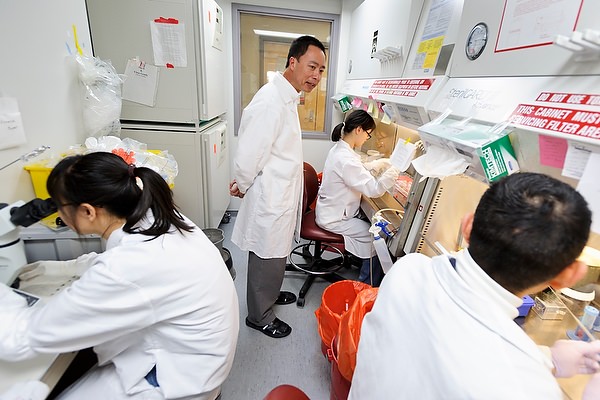Why Animal Research Matters
Animal research is an indispensable tool for understanding complex living organisms, and many University of Wisconsin–Madison research programs study animals as models of human disease and to explore basic biological processes. The university’s commitment to responsible and ethical research conducted under the attention of skilled veterinarians continues a long history of improving human and animal health and well-being.
News
A new kidney — free of daily meds
Thanks to a cutting-edge clinical trial at UW–Madison, transplant patients are returning to a healthy life without anti-rejection drugs.
July 21, 2025UW oncologist studies how viruses cause cancer — and how we can better prevent them
A Q&A with Paul Lambert shows what we know about virus-linked cancers and innovative ways to limit their spread
July 3, 2025UW researchers develop personalized cancer vaccines that slow tumor recurrence in mice
The approach could theoretically apply to any cancer that tends to recur, such as pancreatic cancer and glioblastoma, the most common and extremely aggressive brain tumor.
June 19, 2025Could an arthritis drug unlock lasting relief from epilepsy and seizures? UW–Madison researchers see promising results in mice.
A drug typically prescribed for arthritis halts brain-damaging seizures in mice that have a condition like epilepsy, according to researchers at UW–Madison. If the drug proves viable for human patients, it would be the first to provide lasting relief from seizures even after they stopped taking it.
March 25, 2025Human stem cell-derived heart cells are safe in monkeys, could treat congenital heart disease
Regenerating tissue to support healthy heart function could keep hearts beating stronger and longer, and this is where stem cell research is stepping in.
November 13, 2024Brain cell grafts in monkeys jump-start human trial for new Parkinson’s treatment
People with Parkinson’s disease are receiving a new treatment in a clinical trial started after University of Wisconsin–Madison scientists demonstrated the safety and feasibility of the therapeutic delivery method in a study of non-human primates.
July 29, 2024- More animal research posts
- More UW News posts
Cell transplant treats Parkinson’s in mice under control of designer drug
A University of Wisconsin–Madison neuroscientist has inserted a genetic switch into nerve cells so a patient can alter their activity by taking designer drugs that would not affect any other cell. The cells in question are neurons and make the neurotransmitter dopamine, whose deficiency is the culprit in the widespread movement disorder Parkinson’s disease.

